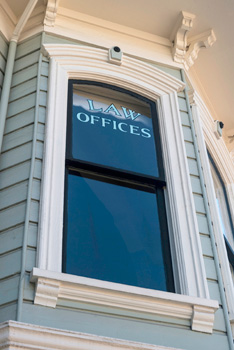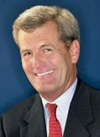 When “George Thomas’s” wife was appointed executive director of a new regional medical center, there was no choice but to relocate both their careers. At the time, George recalled later, he had tried to welcome the opportunity to jump start his practice in a new direction. In reality, there were many challenges of starting over as a new lawyer in a new market. Now, having managed the change successfully, George allowed himself a slight smile of satisfaction. [Note: “George Thomas” is not an actual person; rather, the name represents a composite of the author’s clients and their experiences.]
When “George Thomas’s” wife was appointed executive director of a new regional medical center, there was no choice but to relocate both their careers. At the time, George recalled later, he had tried to welcome the opportunity to jump start his practice in a new direction. In reality, there were many challenges of starting over as a new lawyer in a new market. Now, having managed the change successfully, George allowed himself a slight smile of satisfaction. [Note: “George Thomas” is not an actual person; rather, the name represents a composite of the author’s clients and their experiences.]
Where to Begin
A lawyer’s book of business usually requires a loyal client base, referrals, and familiarity with surroundings. Relocating to a new market means leaving behind your comfort zone. However, this may be an opportunity to expand both professionally and personally. It may also be a good time to take stock of your strengths and weaknesses.
George had accompanied his wife on her visits for interviews and spent time doing his own research. He watched the local news channels, read the community newspapers, and followed websites and blogs describing future events and activities. He spent time walking around the downtown business area and ate lunch at the diner. He went to city hall, the hardware store, and the health food co-op. There is no better way to learn the nuances of a community than by immersing yourself in it.
Everywhere he went, George met local residents, and slowly he began to understand the opportunities around him.
Building Your Platform
George had been with a small firm and wanted to create a similar situation in his new location. He enjoyed the camaraderie of working with other lawyers. More important, he knew that he was not prepared to open his own office and certainly did not want to appear as a competitor to the established local lawyers. With the help of the State Bar, he found a small firm willing to rent him an office and include some shared overhead services.
 Michael F. Moore, Lewis and Clark 1983, is a professional coach for lawyers and founder of Moore’s Law, Milwaukee. He has more than 25 years’ experience in private practice, as a general counsel, in law firm management, and in legal recruiting.
Michael F. Moore, Lewis and Clark 1983, is a professional coach for lawyers and founder of Moore’s Law, Milwaukee. He has more than 25 years’ experience in private practice, as a general counsel, in law firm management, and in legal recruiting.
George focused and developed his practice skills in areas that complemented those of the lawyers with whom he shared the office space. Slowly they began to refer work to him, and he was given access to a valuable resource: their networks of potential clients. George was proactive and followed up with potential links to other people and leads to new opportunities. He always kept his original source “in the loop” so the person making the referral knew what was happening and could see that George valued the person’s assistance.
Using Social Media
Generating and maintaining relationships and referral sources continues to be lawyers’ number-one method of client development. The paradigm shift today is that many of these connections can be enhanced by the effective use of social media networking. Social media can be viewed as a fusion of sociology and technology. They have created new ways for people to discover, read, and share news, information, and content. Therefore, social media networking amplifies our ability to create and maintain our relationships and expands our social competence.
George understood that social media networking is an enhancement to, not a replacement of, traditional networking. To guide his online activities, he created a personal marketing plan with a specific set of goals, objectives, strategies, and tactics. He tried to stay focused on activities that were both realistic and productive. For example, even before the relocation was completed, George made a sustained commitment to work on his digital network at least once per week. To avoid being overwhelmed, he started by using one social media site and expanded from there. He built a profile and joined groups on LinkedIn. He created a professional page on Facebook and followed people and organizations that interested him on Twitter.
When building his digital network, George tried to learn more about other people and tried to get to know them. Who were they, where did they work, what did they do, why were they joining the same groups he was? George investigated the networks of the people who connected with him. He cultivated their interest in himself by demonstrating an interest in them. When opportunities for face-to-face interactions appeared, George was prepared to follow through. Effective traditional networking and social media networking are both all about planting seeds for future opportunities.
Creating Financial Capital
Your ability to successfully build a productive network of relationships will always be a foundation of your personal marketing efforts. Social media networking amplifies your ability to create, maintain, and enhance these relationships. However, it is no substitute for face-to-face interactions. Persistence, self-promotion, and presentation are still necessary.
For example, George’s ability to create “social capital” grew as he expanded his network of relationships and resources. He added to this his own “cultural capital,” that is, his potential influence and corresponding advantage from his knowledge and experience. Maximizing his value from both of these had a direct positive effect on his ability to increase his “financial capital.” The use of social media networking exponentially enhances these activities. It helped give George a competitive advantage and made his network more financially productive.
Personal Credibility
As a newcomer to the area, George knew that one of his keys to success was going to be creating personal credibility, which would come only from his personal actions. The things you do help form other people’s opinions of you, shape their relationships with you, and help them decide whether to trust and respect you. Your activities extend from your immediate peers and out to your clients. Personal credibility directly affects your ability to develop an effective network of referral sources and new clients.
George made a concerted effort to return phone calls and emails within 24 hours. Although he was not always able to provide more information, at least he demonstrated the courtesy to let the other person know his or her message had been received. He worked hard to meet his deadlines, especially those promised to others. George kept confidences and tried to avoid making negative comments about other lawyers, clients, and other people with whom he dealt. He knew that his personal credibility is one of his major professional assets and he needed to protect and enhance its value.
Getting Face to Face
When relocating to a new market, successful client development requires raising your personal visibility within that market. This will be most effectively achieved through face-to-face communication.
That is one reason why people-to-people (P2P) communication skills remain a primary success factor in the business-to-business (B2B) world. You cannot rely solely on your website, LinkedIn page, or other online resource to share your information, communicate your ideas, and expand your relationships.
George began attending the local Rotary Club meetings and introduced himself to the business and civic leaders who also attended. He volunteered on the Business Development Council, which had been organized to revitalize the downtown area, and extended his network with breakfast and lunch meetings to follow up with new acquaintances. As a result of his active visibility, George was appointed to head the finance committee, where he demonstrated his leadership skills. Leaders and decision makers in the community soon knew they could count on George as a valuable resource, and this fueled further client-development opportunities.
A Reputation for Trust
As a new lawyer in a new market, one challenge is building a reputation as a trusted advisor. Client development eventually leads to persuading people to trust you. The people who know you the best and trust you the most will be most likely to hire you to handle their legal matters. Your professional image is a crucial element of this process. Do not approach potential clients with arrogance or excessive confidence in your own abilities. Try to carefully identify with their own challenges and point out what you might be able to do, what the limitations could be, and what the potential clients should do. This direct, honest approach will help build your reputation and credibility in a new market.
George knew that people often resist doing what other people try to make them do and instead prefer to make their own choices. To be successful in his new market, George would need to encourage potential clients to be ready to take the next natural step: matching his specific skills with their specific needs. To do this, George made sure to listen carefully to what these people said. As he expanded his network, he developed a reputation for trust, and people felt comfortable telling him about their problems. His express purpose was to help any potential client get what the person needed or wanted. He created a mutual value exchange, and people chose to solve their problems by hiring him.
Embrace the Opportunity
Now in his new office, George glanced down at the source that sparked his recollection of change: His “word of the day” calendar on the desk featured “transition” and defined it as “a passage or evolution from one stage to another.” When he relocated his practice, he chose to embrace the opportunity to expand both professionally and personally. He researched his options, became involved in his new community, and focused on creating an effective network.
George built success on his reputation as a problem solver and a trusted advisor. He lived the words of that great country lawyer, Abraham Lincoln: “Things may come to those who wait, but only things left behind by those who hustle.” You, too, can live these words.
